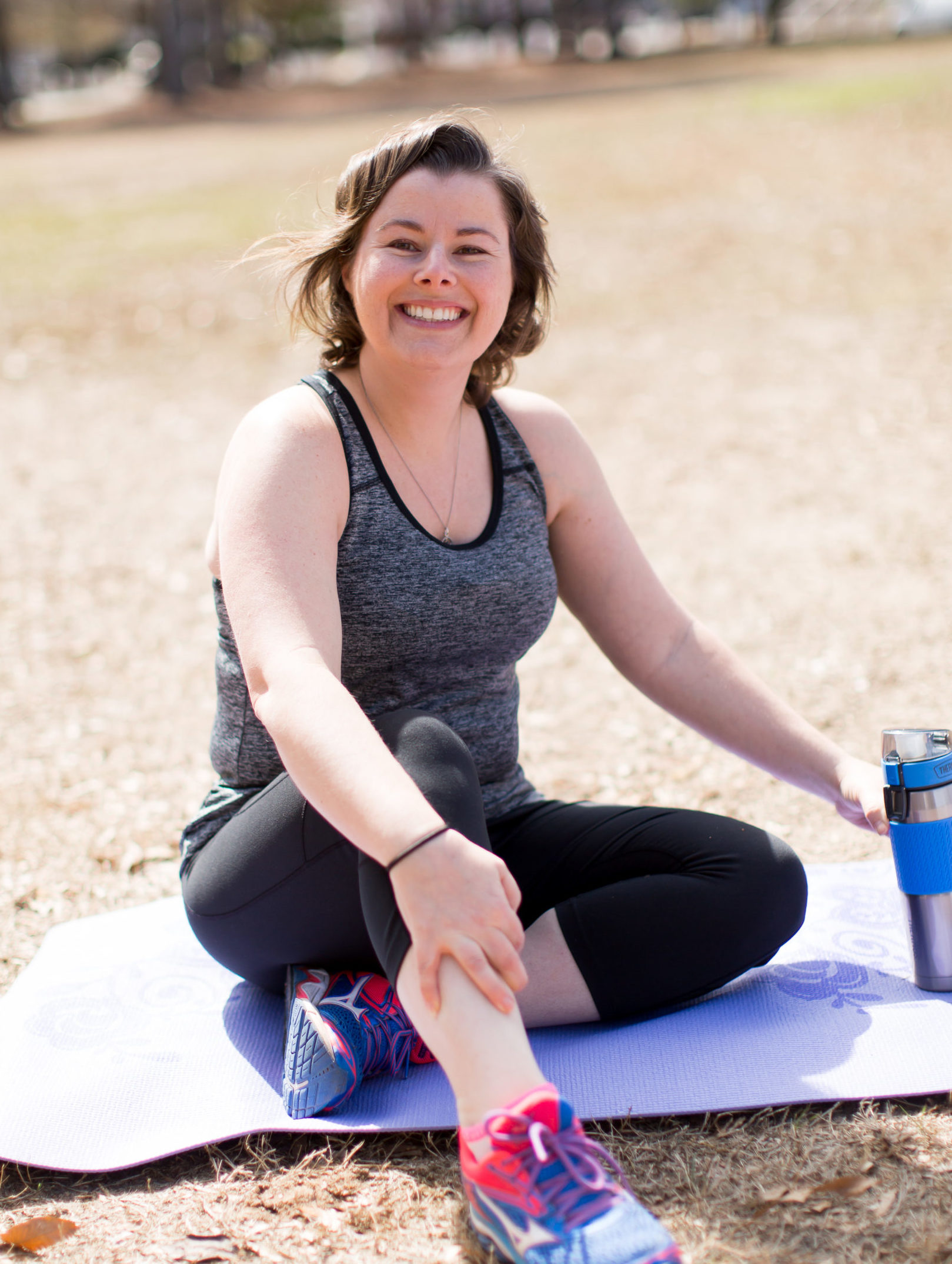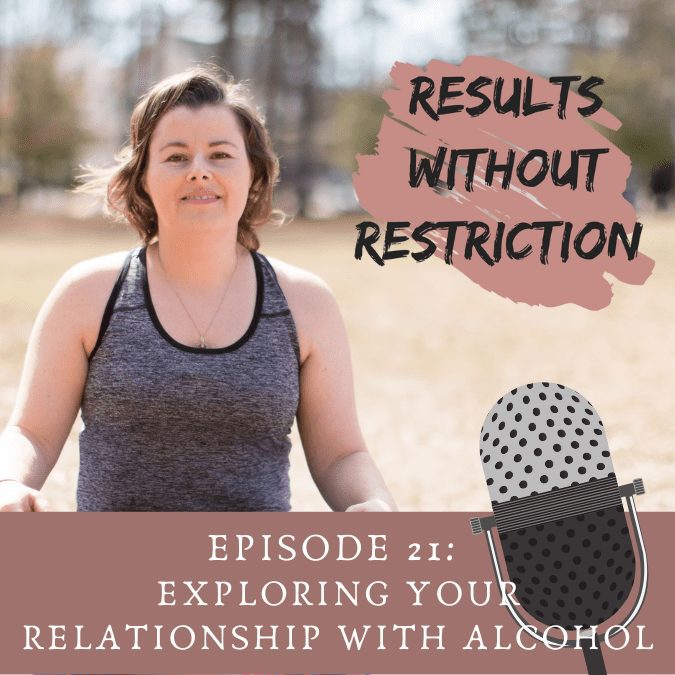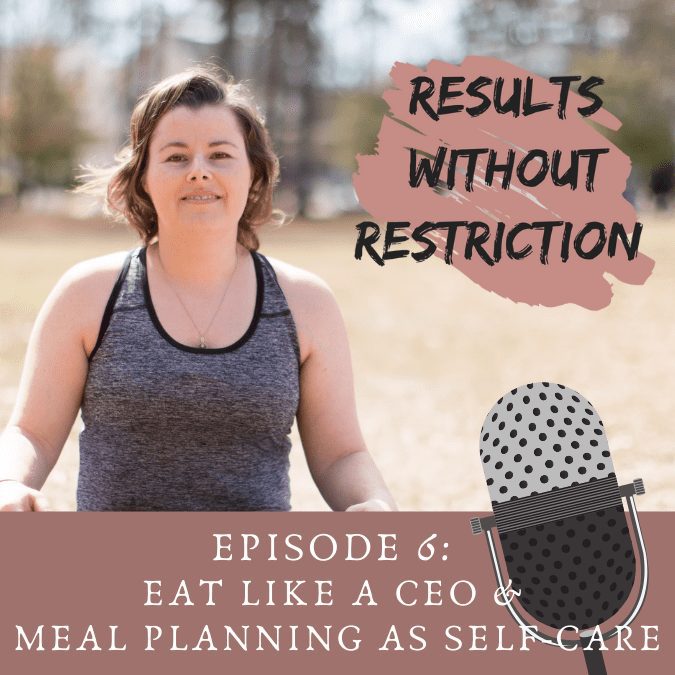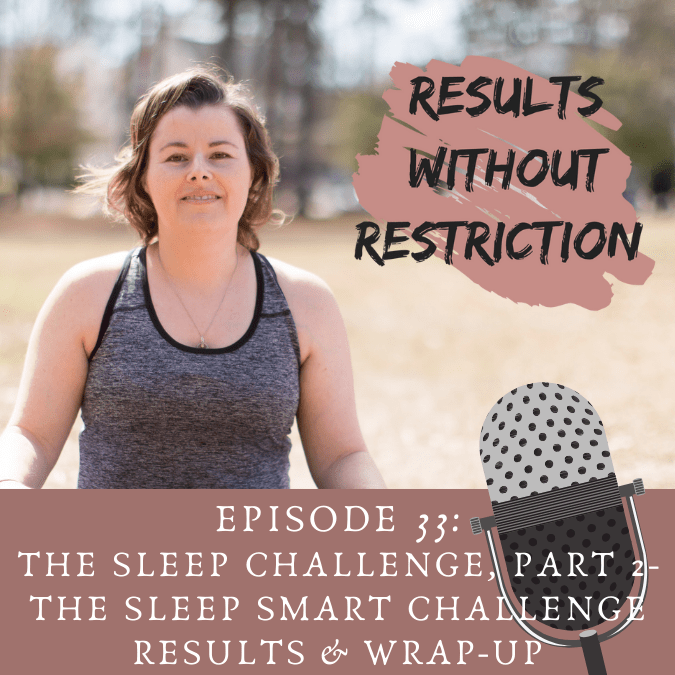Subscribe: Apple Podcasts | RSS
Table of Contents
Listen to the Episode with Sarah Burby
Subscribe: Apple Podcasts | RSS
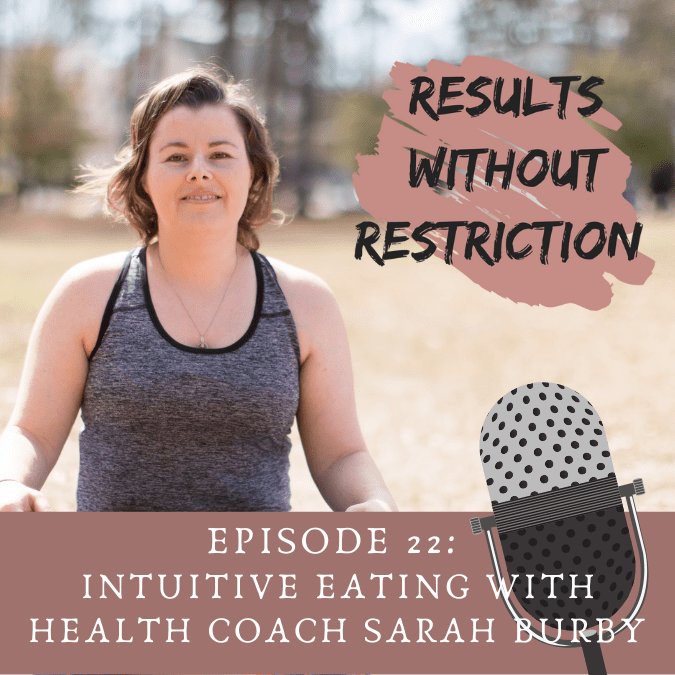
Episode Transcript – Intuitive Eating with Sarah Burby
Welcome everyone, I am here with Sarah Burby who is a health coach and she’s the owner of Small Changes Health and Wellness Coaching where she supports and empowers her clients to meet their health and wellness goals by focusing on small, sustainable changes that they can maintain for the rest of their lives. She also helps her clients heal their relationship with food and exercise as well as improve their body image.
Welcome Sarah. I’m actually really excited about this episode because this is the meat, I hate to use, I don’t eat meat, but the meat of like what this whole brand is about. So having coaches, you know, intuitive eating, health at every size, really promoting that weight neutral approach to health is really important. So I’m excited. So start kind of at the beginning.
What brought you to this point? What is your origin story?
Sarah Burby: Yeah, so I have kind of a long and not very straight way. I got a master’s degree in applied behavior analysis. And typically ABA is most commonly associated with autism. So working with with children, adults on the autism spectrum. And I think there’s a great need for that. And I think I will always love working in that space in some capacity.
But I just thought, you know, how cool would it be to apply the science of applied behavior analysis to health and wellness. And at the time when I was in graduate school, which feels like yesterday, but was like 10, 11 years ago, no one is really doing that yet. Everyone was saying, oh, you can apply ABA anywhere. But but it was really only widely applied to autism.
So at the time, being new in the field and not really having my feet wet yet, I just didn’t have, I guess, maybe the confidence or the direction of how to get into this field. So then kind of fast forward, a few years later, I started really taking on some additional certifications.
I got a health coaching certification, a nutrition certification, most recently an intuitive eating counselor certification and just started to kind of build up my expertise in that area. So then I could feel confident in applying ABA to health coaching.
Sarah Burby: So in 2020, the famous 2020 year, I opened Small Changes Health and Wellness Coaching, where I primarily coach based using the science of ABA, but with an intuitive eating framework.
So it sounded like you were kind of like on a teacher track, like you were going to be a teacher. Very similar school conflict, working in school as a consultant.
But you took the knowledge that you gained and you said, oh, you know what, I really want to apply this to health and health and wellness. What prompted you to want to apply it in that area?
Sarah Burby: I think I’ve always been really interested in that area. Personally, I’ve had my own personal journey of poor body image and kind of orthorexic type behavior with this obsession with being healthy. And I went through that and I had that struggle and it I went through it for for many years. I aspire now to be what I wish I had 15, 10, 15 years ago.
So that’s kind of what piqued my interest. And again, to me, the science of applied behavior analysis just so naturally flowed into health coaching, right? Because behavior is behavior, whether we’re talking about maybe reducing maladaptive behavior and then individual with autism and trying to teach some replace the behaviors or we’re talking about, you know, behavior as far as your relationship with exercise, your relationship with food.
To me, it’s all it’s all the same thing, right? It’s just how we address it.
So I think that’s kind of where my interest kind of sparked.
So it was your own personal journey that that shaped the direction that you you saw you saw an opportunity to take what you were learning and apply it in a way that would have been helpful for you for your own personal experience. And I love that we are seeing now so many coaches and trainers.
It has really come a long way in the last few years and recognizing the harm that’s being done with, you know, pushing over exercising, under eating, calorie counting, all that stuff. Really the long-term effects of it.
So we talk a lot here about intuitive eating. Can you talk about how intuitive eating and mindfulness are integrated into the process that you use with your clients?
Sarah Burby: Yeah, so and the missing of your listeners already have a backstory of what intuitive eating is, but just a quick, you know, recap. It’s really healing your relationship with food, healing your relationship with exercise, and also healing your relationship with yourself, right?
Like, like, what do you think of yourself when you look in the mirror? Do you do like what you see? And if you don’t like what you see, are you perseverating on it all day? Is that constantly what you’re thinking about? And to me, that’s health, right?
Like we think about health and we think about what we eat and we think about exercise, but we don’t think about this constant, what the constant stress of constantly worrying about what you’re eating and you’re putting into your body or constantly worrying about if you’re getting the most intense exercise in, like that affects our health so much too.
Sarah Burby: So with intuitive eating, I really like to, number one, work with my clients and say, it’s not just eating, right? The name intuitive eating is we think it’s just eating skills, but it’s so much more raw than that. And there’s so many different areas we can work on.
Like I said, with exercise, repairing your relationship with exercise and movement, how you, how you feel about yourself and kind of breaking down maybe what area of the client is struggling the most, starting with that, and then going into all the different aspects of intuitive eating.
I do appreciate that you gave us that description of what intuitive eating is because they could be the first time here and learning about that. So this is really important. You just mentioned that, you know,
Learning to eat intuitively can impact mental health, physical health. Why is that important?
Sarah Burby: There’s such a strong focus or push, if that’s the right word, on, on weight loss and looking a certain way and having this like ideal body. And I think that was probably always around, but now with every social media app and platform there is out there, it’s certainly getting worse and it’s starting at a younger age. There’s this like pressure to have to look a certain way or eat a certain way. And that’s not reality, right? And it’s really, really harmful, but I also think it’s the norm.
So it’s really hard to kind of separate from that. And that’s where I see the importance of intuitive eating is like talking even about body diversity, right? I talk about that with my clients all the time is like you and I could literally eat the exact same thing every single day for the rest of our lives.
We could exercise the exact same way every day for the rest of our lives. And we are never going to look exactly the same because we have a different genetic blueprint, but that’s not pretty to talk about on social media. That’s not glamorous.
Sarah Burby: Like no one wants to post about that on social media because it’s not as glamorous as, Oh, I lost 30 pounds in a month by drinking the shake or going on this diet. You know what I mean? So I think intuitive eating is more, it’s a little bit deeper, but I think it’s so, so important because of all these messages that we’re getting.
And I kind of say the opposite and kind of glamorize really restricted eating or over exercise and things like that to get, like I said, this ideal body, which is so silly because what does that even look like? It’s an illusion, right? And unfortunately we live in a world where being in a smaller body is idealized, right? We live in a world that favors people in smaller bodies.
So I don’t, I don’t shame anybody and I don’t fault anybody for having the feelings like, Oh, you know what, I look in the mirror and I wish that, you know, smaller because you know what? Your life would maybe be easier, right?
This is the world that we live in, but we’re all doing our part here to normalize, like you said, body diversity and acceptance and respect for people in all different shapes, sizes. I love that this is becoming more widespread and people like you are sharing the good word. And especially on social media where you said it’s teens, young adults on these platforms and they’re being bombarded by all this messaging.
So I love that this is, this is becoming more popular. So we talked a little bit about diet culture, the prevalence of this messaging and how harmful it is.
What are some, some negative impacts that you’re seeing on your clients due to exposure to diet culture?
Sarah Burby: Oh, I see a lot, a lot of, um, labeling how they eat as good or bad, right? So like I ate a salad last night, I was good. Or I ate ice cream last night, I was bad. And, and that breaks my heart when I hear things like that, because I’m like, well, did you enjoy the ice cream? Yeah. Okay. Like, like their food is neutral, right? It’s not good or bad. But if you look at diet culture and again, social media, it’s, it’s, um, putting food into these categories.
Even the term clean heat, clean eating. Like I hate that term so much because I hate, I hate that. I hate it. It’s awful. And, and think about if you’re, if you’re calling something clean, like it’s typically like organic, or I think maybe like whole foods, like fruits and vegetables, but that’s such a privileged statement to make because what if a family can’t afford to eat quote unquote clean? Like who’s not to say that they’re, what are you saying that their food and what they eat is dirty? Like, how does that make someone else feel?
So I’ve had to have clients come to me and say, you know, I can’t afford to eat quote unquote clean. Um, like, what do I do? Am I doomed? I’m like, no, you’re not doomed. Like it’s just, that’s just diet culture telling you that you have to eat this certain way, or again, you have to look a certain way.
A lot of clients have come to me from diet culture that have tried like really intense workouts where you like work out twice a day for 75 days.
And if you miss a day, you have to start back at one again. And like all this like negative self-talk that they, that they’ve come to me with was like, I couldn’t do that. You know, I have no willpower. I’m not strong enough. And it’s like so heartbreaking.
I’m like, not you, it’s this ideal that you have to be doing this extreme workout and eating behavior.
But you know, diet companies make so much money off of us buying into these things. And they’re meant to fail, when they fail then we feel badly about ourselves. And we do it again and it fails. And then we feel badly about ourselves. So it’s this whole big, vicious cycle.
Thank you for pointing out that all of these programs are designed to set us up for failure to keep us on this roller coaster, this loop of feel like we’ve made progress, quote unquote, and then your body does what it does. And now you’re back where you started.
And now you’re seeing that as failure. And not to mention one of the most common side effects of intentional weight loss is long-term weight gain. So an industry that makes money off of you trying to lose weight, knowing, knowing that whatever they sell to you is going to put you back where you started or, or higher, it’s a billion dollar industry for lots of good reasons.
Sarah Burby: Right. Yeah. And also like, there’s a ton of research coming out talking about the dangers of weight fluctuation, right? So like diet cultures, advertisers, you know, lose weight, it’s good for your health or all this kind of stuff.
But really that dangers of weight cycling, even those five to 10 pounds, if you’re constantly gaining, losing, gaining, losing, that’s a lot more dangerous than being five pounds heavier, lighter, whatever the case may be, you know, and that’s not talked about enough is the danger, the dangers of constantly fluctuating on your weight.
Sarah Burby: I agree that it’s a danger and it’s not talked about because there’s no money to be made in letting people stay in larger bodies for that industry, then nobody wants to talk about it. Let’s jump into intuitive eating, adopting an intuitive eating practice and what some misconceptions people might have about what that looks like and the impact that it can have.
The two biggest misconceptions that I see are number one is if I eat intuitively, I’m just gonna eat like chocolate and donuts and ice cream all day, every day for the rest of my life. And that’s just not true. I hear that from people that maybe did like a quick Google search, read an article about what intuitive eating is, and then just kind of made that assumption.
But it’s not true. It’s really about giving yourself that unconditional permission to eat because we know once we label a food as bad, quote unquote, or off limits, we’re immediately going to want that food more. It’s just a natural response. When we deprive ourselves of anything, we’re immediately going to want that more. It’s kind of wild if you give yourself permission to say, I feel like having a donut, I’m going to have a donut and I’m going to enjoy it. I’m not going to feel guilty if I eat it.
Once you learn to do that, which takes time, depending on your learning history, you learn to eat a donut or two donuts and whatever the amount of donuts is and you feel satisfied and then you move on to something else and you can kind of get in tune with your body and what it craves different times of the day and things like that. So I think that’s one misconception that I hear quite frequently. And another one I hear a lot is like, I let myself eat intuitively
.And that’s how I got to this point where I’m really unhappy in my own in my own body. And I would never tell somebody that that’s incorrect if that’s how they truly feel. But when I dig a little deeper typically, but are you really giving yourself that unconditional permission to eat? Are you really letting go of food labels of good and bad, clean, unclean, what you should and shouldn’t be eating? The answer is usually no.
So why they might think that they’re eating intuitively, they have that kind of little diet culture voice in the back of their head that’s really not truly embracing intuitively eating to the fullest extent. And so that’s why they kind of have those, those feelings.
I’m going to add on to yours because I’ve, you know, when I talk to people about intuitive eating, they almost feel like if they follow an intuitive eat, if they adopt an intuitive eating practice, they’re going to lose weight because their body is just naturally going to like go to quote unquote where they think it should be.
Right. So they’re like, oh, if I stop obsessing, just let my body do this thing. So way to make my body smaller and intuitive eating has nothing to do with body size.
Sarah Burby: Yeah, yeah. So that’s a good point too. And I try to make that very clear, even when I do initial consultations is I cannot guarantee that you will gain weight, you might gain weight, you might lose weight, you might say exactly the same, like it just depends on so many different things, right? No one can predict that when you become an intuitive eater, what will happen to your body.
But I have heard that as well as like intuitive eating for weight loss almost. The other misconception that I get like to kind of go back to your first point was people don’t trust themselves, right? Because they have this history of restrictive eating, they say, oh, I can’t just eat whatever because I’ve restricted myself for 20 years and I’m just going to go buck wild and I won’t be able to stop. So they fear not having that control and they they don’t know what’s going to happen.
Yeah. And I think that’s a valid fear. And I think that’s like, that is something that we explore quite a bit.
And that’s where it goes into all these different principles of intuitive eating, because for people that have dieted for a long time, they actually lose that sense of hunger and that sense of fullness.
So like, for example, people that chronically count calories or count macros or whatever it is, you’re thinking think about it, you’re constantly eating on a schedule, you’re eating to a certain to hit a certain goal of this many carbs or this many fats and proteins, or you’re going to limit yourself to this many calories. So that’s five o’clock and you hit your max calories for the day, regardless if you’re hungry or not, you’re not eating if you’re following a diet like that, right? So after a while, you start to lose that feeling of hunger and that feeling of fullness.
So I think that’s even a lot of it with intuitive eating is and it sounds like so silly almost, but it’s relearning hunger and fullness cues. So you don’t eat to the point where you feel really sick. And maybe when you’re a new intuitive eater, maybe it happens once or twice or it happens a few times.
So you have that experience and you say, okay, what did you learn from that? And usually they say, awful, I felt terrible. It was, I felt sluggish and I did. Okay, that was a learning experience.
Now we know for next time, how do you know you’re starting to get full or how do you know that you’re hungry, right? So it’s all kind of all these different 10 principles. Really, they’re all so intertwined. The whole like, I don’t even know what hunger feels like, or I’ve learned to ignore it.
I’ve learned to tune it out. My body doesn’t even feel hungry anymore because it knows it can ask all it wants. It’s not going to get anything. So and information, your body needs energy. It needs nutrition. It’s trying to communicate with you like, don’t ignore it. Please. Yeah, yeah. Our bodies know a lot.
They were willing to listen. It’s kind of crazy. So when we talk about learning to identify hunger and fullness cues, what are some things that your clients have said to you about their experience that they were like surprised about that in particular, one of the ways that I usually, you know, kind of teach that skill is is looking at like a lot of the hunger skills, right? So on a level of one through 10, one being like, I am super hangry.
I’m going to anything and everything and 10 being like, I am so uncomfortably full. I feel like I’m going to get sick almost right. And having client will go through like, you know, what is a two look like for you? What is a seven look like for you? And kind of set a goal of like, okay, this week I want to start eating when I’m at a four rather than a one where I’m starving and feel like I’m out of control.And I want to stop eating when I’m at a seven versus a 10. Right. For example.
And having clients kind of self monitor and learn that skill. It’s kind of like this aha moment, like, wow, like I didn’t even realize I was doing this because I think again, so many times it’s a habit of restricting, right? So like not eating, not eating, not eating. And they don’t even realize how hungry they are or why they’re that hungry.And a lot of it is eating so much where again, it’s not even like really when we talk about like the satisfaction factor of intuitive eating, they might be eating foods and what they feel like is a large quantity, but they’re not even enjoying it.
It’s just, it’s, and when we work on intuitive eating and slowing now and monitoring your hunger and fullness, it gets easier of our time and then they’re, they’re enjoying their food more. It’s a more pleasant eating experience, storing eating after eating.
So I think it’s like a really big, like I said, like aha moment of I didn’t even realize this was how it was happening internally in my body, because they were just kind of on autopilot. So you’re bringing in like some mindfulness practice at the same time to be present while they’re eating. What are the, what are they feeling? What are the sensations? What’s happening, you know, inside, outside, all around and really just being present for it.
Sarah Burby: Yeah. Yeah. And even just taking like stopping mid-meal, right? And just, I invite clients to take a note of how you feel mid-meal. Like do you feel satisfied? Do you feel, are you enjoying the food? What’s your environment like? Is it chaotic? You know, is it peaceful? And then again, you can kind of then go in some more detail of like what, what foods do you prefer or not prefer? Like you, what textures do you prefer and not prefer? What smells do you prefer and not prefer?
Because again, you’re really almost relearning how to eat again, because for so long, whether it be a month or years and years that you were following this diet culture, whatever restrictive diet it was, you lose so many of those basic skills without even realizing it.
You just made me remember something about when you talk about relearning the foods you actually like and you don’t like, because when you follow, you know, when you’re a chronic dieter or, you know, you’re so entrenched in diet culture, you have food lists.
And there are foods that you automatically choose because they are quote unquote, a better choice healthier, right? Like brown, always choose brown rice over white rice or wheat bread over white bread. When I did this, I found out I realized I hate brown rice. It is not good. I don’t like it. It’s disgusting. I love white rice. And the freedom to just say, you know what, I would rather have white rice.
And you know what, if I have a big bowl of it, great. And I mean, I gave myself permission to eat as much of it as I wanted. I found, you know what, I can eat actually the same amount or less.
It doesn’t and I’m not even measuring it. I’m not obsessing about it, but I it’s so much more enjoyable to have the rice I want to eat enough when I feel like I’m supposed to eat.
Sarah Burby: Totally, totally. And that’s so common. And even with like, like cookies or things like that, I have clients come to me and they’re like, I ate an Oreo and it was so good. Like I’m so good at eating these like cookies, but they’re not really cookies because they taste disgusting.
I don’t even like them. cookies with the rocks and sticks in them that have fiber that they’re like, that you can feel like you’re gnawing on it and you’re like, right? Yeah, yeah. That’s your cookie, right? Nick, no, have a real cookie.
Um, one of the other things that I love about intuitive eating and the trepidation really of having that freedom is that people are afraid that they’re going to do it wrong.
Sarah Burby: Yes. And what I love about intuitive eating is there are no mistakes.
It’s all information. Yeah. And I think that mindset comes from again, chronically counting calories or counting macros, or I don’t even know what the popular diets were before that.Right. But it was either met your goal, your dinner, right? It was either like black or white. It’s black or white.Yeah. And intuitive eating is so not black or white, which is really hard for people to, I think, understand at first because, you know, you’re so used to this rigid all or nothing black and white thinking. But like you said, it is so not intuitive eating.
There’s no literally no right or wrong way to do it. Everything is a learning experience all about getting attuned with, reattuned with your body.
At the end of the day, we know our body’s best, you know, so there’s nothing that we can do that that’s right or wrong. There’s no having a good day or a bad day. Like that just those terms just don’t exist, which I think is, is the really awesome thing about it. Like there’s no guilt involved.
There’s no shame involved. There’s nothing like I feel bad because I did or didn’t you X, Y, and Z. I mean, it’s so freeing to be able to have that perspective. Extremely freeing and it’s it’s all about just relearning how to eat and trust yourself.
Having that freedom to say, okay, I’m exploring what feels good and what hunger and fullness look like for me, what kind of foods I do want and don’t want to eat. So Sarah, let’s talk a little bit about how you work with your clients and what that looks like in terms of your coaching program and other sessions that you offer. Yeah, so I offer primarily one to one coaching starts at 12 weeks.
It can go anywhere to 24 weeks. I don’t really like to put a timestamp on it because like I said, everyone’s journey is different. I don’t want anyone to feel badly if they did 12 weeks of coaching and they don’t feel like they’re, they’re fully ready.
And it’s totally common. Again, there’s so many different factors that play into how you develop intuitive eating skills, but basically clients come to me that are like, I’m done. I’m done dieting.
I’m done restricting myself. I’m done feeling trapped in my own, in my own skin and my own body. And I’m ready to, I’m ready to do this. And I just need some support. I need some guidance. And that’s, that’s where we start.
So we start with the first session incorporate, like you said, a lot of mindfulness, a lot of acceptance and commitment therapy, because a lot of learning, intuitive eating, and to me is it’s a lot of mental things, right? It’s a lot of things with our mind. So we learn a lot about how to unhook, but really to like separate from those unhelpful thoughts, those diet culture thoughts or those thoughts that you’ve had about food, about your, about your body, whatever it may be for so long. And it’s like really, again, there’s no set structure as of like week one, we cover this week, two, we cover this because it really depends on your own, on your own personal experience and what’s showing up for you and what particular area you’re struggling in most.
And we might focus on the principle of honoring your hunger and for one client that might take a week and for another client that might take four or five weeks, and there’s no right or wrong way, you know, that it’s okay, everyone’s going to be different. So, you know, the length of time that we go through each of the 10 principles and, and maybe you’re okay with a couple principles that maybe you’re really struggling with, with finding peace of movement and maybe the whole 12 sessions, we’re just working on finding peace of movement and that’s okay too. So it’s super individualized to wherever you are in your intuitive eating journey.
So if somebody wants to get started with you, what does that look like?
Sarah Burby: Every client starts with a free initial consultation. And that’s just to get a good idea of what the client is most interested in working on. Really, they can ask me anything and making sure that we’re that’s where the right fit, because I want that potential client to feel comfortable working with me confident working with me. And if someone comes to me and says, you know, I strictly want to work on weight loss and nothing but weight loss, we’re probably not the best fit. And that’s okay. I just don’t want someone to sign up for a coaching package and kind of have expectations that are different than what might happen during one to one coaching.
So free 20 minute consultation session that can be found on my website, on Instagram, Facebook, the link to the free session is all on there. And then after that, we decide that we’re a good fit, then we go right into the first session of coaching.
Okay, Sarah, you actually have something free for our listeners – It’s called intuitive eating five myths debunked about intuitive eating. We’ll put the link to this in the show notes so that the listeners can grab this. And if you’d like to connect with Sarah, you are on Instagram, you’re on Facebook.
And we’re also going to link to your beautiful website. We’ll also put your your scheduling link. So if somebody wants to jump on the phone with you and and get that consultation to see if they are a good fit to work with you, that will be there as well.
Sarah, we’re going to wrap up. And what I’d like to do at the end of every episode is have our guests give us their top three tips. So go ahead and give me what you got.
Sarah Burby: Tip number one, I would say is to kind of do a social media cleanse, right? So just be, try to be aware of who you’re following on social media, whatever your social media platform is, Instagram, TikTok, I don’t even know what’s out there anymore. But what you follow affects you more than you think it does. So and the things that you like and you comment on and share, you know, whatever algorithm it is, you’re going to see that content more.
So it can be pretty eye opening to kind of just take a look at that and maybe stop following accounts that you find unhelpful or triggering or whatever the case may be. So tip number one is it’s just kind of look at your personal social media and, and do a little clean out.
Can I just say this is the only type of cleanse that I recommend?
Sarah Burby: Yes. I agree. I agree. Tip number two, and I don’t know if this is really a tip, but I think like, like a normalize challenging diet culture a bit and normalize, you know, going against the grain a bit
And I think the more that we talk about it and the more that we normalize the fact that that often diet culture is really just disordered eating in disguise. And the more it, the more we make it the norm, the more impact that we’re going to have.
I know it can be hard and uncomfortable to talk about that, that those topics at first, but I encourage people to do that even if it’s just with, with friends or family members and kind of along those lines, setting boundaries, right?
If you hear talk about diet culture or someone says something that doesn’t sit right with you, speaking up and saying something about that, because again, those things seem so small, but they’re going to trickle down and have a really big impact, I think, in the only way that we’re going to kind of be able to shift the culture is if the more of us stand up and talk about it.
I love the idea of normalizing destruct, you know, taking down diet culture, and really pointing out these innocuous or seemingly innocent comments or things that we’re doing that are really harmful to people who are struggling with, you know, any kind of disordered eating or eating disorders and really, and trying to get out of that.
I would love to normalize not commenting on people’s appearance, you know, when they change, if somebody’s body gets bigger.
FAQ with Sarah Burby
Who is Sarah Burby?
Sarah Burby, M.A., BCBA, NBC-HWC, is a Board Certified Behavior Analyst, National Board Certified Health and Wellness Coach, Certified Intuitive Eating Counselor, Certified K–6 Teacher, Precision Nutrition–certified coach, Barre Eclipse Instructor, and Adjunct Professor.
She specializes in helping clients break free from diet culture, repair their relationship with food and movement, and build sustainable habits grounded in self-compassion.
What is intuitive eating?
Intuitive eating is a non-diet, evidence-based approach that helps individuals rebuild trust with their bodies, heal their relationship with food and exercise, and learn to listen to natural hunger and fullness cues. It emphasizes internal awareness over external rules, supports mental and physical well-being, and encourages unconditional permission to eat without shame, guilt, or restriction.
VIEW INTUITIVE EATING on AMAZON (affiliate link)
How does intuitive eating support mental and physical health?
Intuitive eating reduces anxiety, obsessive food thoughts, and the shame often created by dieting. It also supports metabolic health by reducing weight cycling (repeated weight loss and regain), encourages mindful movement, and promotes more balanced eating patterns. Many people experience increased energy, improved body image, and reduced stress around food.
What are some negative effects of diet culture that Sarah Burby sees in her clients?
Common issues include:
• Viewing foods as “good” or “bad”
• Feeling guilt or shame after eating
• Chronic dieting or restriction
• Overexercise or rigid fitness expectations
• Loss of hunger and fullness cues
• Internalized weight stigma
• Feeling like a “failure” when diets inevitably stop working
Diet culture often leads to weight cycling, disordered eating patterns, and long-term harm to mental and physical well-being.
Is intuitive eating just eating whatever you want, whenever you want?
No. This is one of the biggest misconceptions. Intuitive eating isn’t about losing control—it’s about regaining trust, reconnecting with bodily cues, and enjoying a variety of foods without restriction. Once someone removes food rules and guilt, cravings typically normalize rather than intensify.
Will intuitive eating make me lose weight?
Intuitive eating is not a weight-loss strategy. Some people may lose weight, some may gain weight, and some may stay the same. The goal is to support your body in reaching its natural, sustainable set point—not pursuing a specific size.
RELATED: Check out our Book Club post about the book Intuitive Eating
How does Sarah Burby integrate ABA and ACT into her coaching?
Sarah uses behavior science (ABA) and Acceptance and Commitment Therapy (ACT) to help clients re-learn hunger and fullness cues, unhook from unhelpful thoughts, reduce all-or-nothing thinking, and build habits aligned with their values. Her coaching blends mindfulness, behavioral strategies, and intuitive eating principles.
What does working with Sarah Burby look like?
Sarah offers one-to-one coaching programs that typically span 12–24 weeks. Every client begins with a free 20-minute consultation to determine whether it’s the right fit. Coaching is individualized—no two programs look exactly alike—and focuses on the client’s unique relationship with food, movement, and body image.
Does Sarah offer any free resources?
Yes! Sarah created “Five Myths About Intuitive Eating—Debunked,” a free guide to help you understand the basics and clear up confusion. The link is available in the show notes and on the episode page.
Where can I learn more or schedule a consultation with Sarah?
You can connect with Sarah Burby on Instagram, Facebook, or through her website. The show notes include direct links to her scheduling page if you want to book a consultation or explore coaching.
Is this episode medical advice?
No. This episode is for educational and informational purposes only. Always consult with a qualified medical provider before making changes to your nutrition, fitness, or health routines.
Meet Sarah Burby M.A., BCBA, NBC-HWC
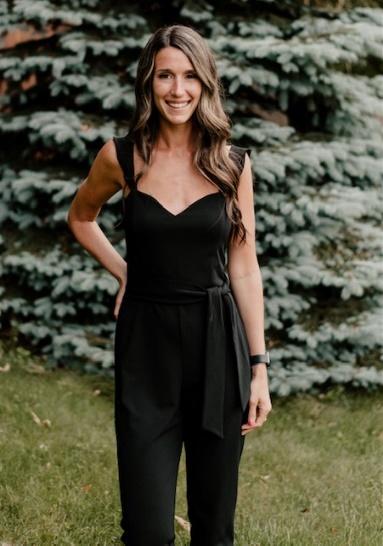
Sarah Burby is a Board Certified Behavior Analyst (BCBA), National Board Certified Health and Wellness Coach (NBC-HWC), Certified Intuitive Eating Counselor, Certified K–6 Teacher, Precision Nutrition–certified coach, Barre Eclipse Instructor, and Adjunct Professor.
Sarah Burby has extensive training in Acceptance and Commitment Therapy (ACT) to support clients navigating body image concerns, disordered eating, and the long-term impact of growing up in diet-focused environments.
Her coaching emphasizes sustainable, compassionate habits rooted in flexibility, autonomy, and self-trust. In addition to coaching, she provides mentorship for small business owners in the wellness space.





